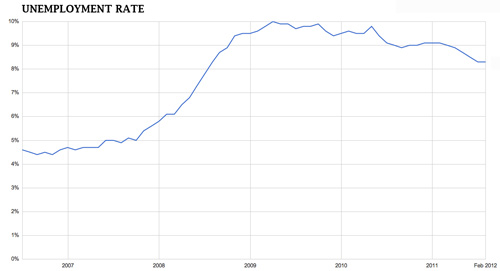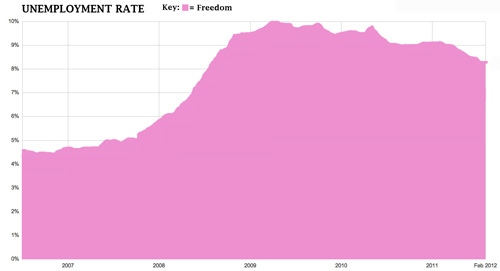Misunderstanding is the cause of so much pain. We at The Stoneslide Corrective would like to correct one misunderstanding that has become rampant in recent years. We would like to lift this veil of pain. We are nothing if not empathetic.
Since 2007, the unemployment rate has gone from under 5% to 9%. That represents approximately seven million additional people out of work. This is commonly called a “national nightmare” or a “tragedy.” We prefer to see it as a tremendous advance for the cause of liberty.
When you are freed from your job, you have eight hours a day, forty hours a week, two thousand hours a year, filled with choice. You can do whatever you want. By our calculations, the world now has 14 billion more hours of liberty annually.
Speaking from personal experience, there has never been a moment I’ve been at work when I’ve not wished to be doing something else. But that is not proof enough. Here at The Stoneslide Corrective, we are devoted empiricists. So, I walked down the hallway of my office this afternoon and asked each person if they could think of even one thing they’d rather be doing at that moment. The results: 11 yes; 0 no. One person started weeping. I counted that as 1 NA.
Think of it: Along this one hallway—one of tens of millions of its kind–with its long fluorescent bulbs overhead and yellow shadows on its walls, are huddled 11 people in chains. They raise their hands to the keyboard, slowly, sadly, for they are encumbered with chains. They trudge to the little kitchen and insert a plastic dish with old macaroni into a microwave that smells like a thousand stale lunches. Is this the meal of a free person? No! Freedom, the bright sky, the warmth of human affection, the ecstasy of creation or coition, these are facets of experience that only exist outside these dim corridors.
How can we regret the shattering of such chains?
If you riposte that the loss of income commonly associated with unemployment might so limit one’s options as to outweigh the increase in free time, well, we just have to shake our heads, sadly, and remind you that it isn’t money that makes us happy. You would keep chasing possessions, dreaming that they will make you happy. We would like to help you.
Let us show you two charts. The first one is a conventional representation of unemployment rates over the last five years. The next shows how these numbers should really be interpreted.
Exhibit 1
Exhibit 2
Rightly understood, the Great Recession has been the greatest contributor to human freedom since the Great Depression. You can understand now why some of our politicians have fought so hard against schemes to manipulate the labor market. These politicians stand for freedom.
The one thing that keeps our celebration from being complete is the sad irony that the people who really made this possible—the bankers—continue to suffer under high employment, record bonuses, and almost unstinting consumption.




